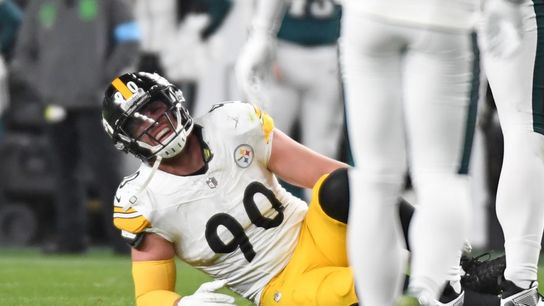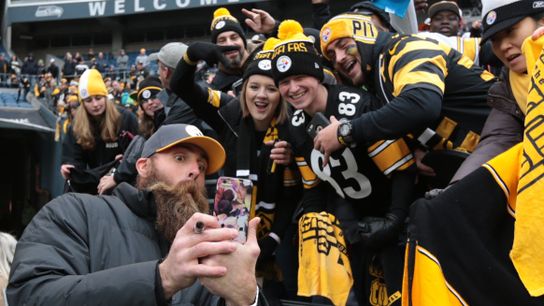Good hits in a football game used to be just part of the fun. That kind of shock that wakes you up, but throws you off. In athletics, we learn how to be strong and get back up. It's not a huge deal. If that hit makes you ill, tired, forgetful, or angry for months, it's a different issue. And not everyone knows what to do next.

Eric Hartline / Imagn Images
Steelers' TJ Watt looks on in pain after suffering an injury against the Eagles.
Sports-related brain injuries are tricky. They’re not always immediate. Sometimes you walk off the field thinking you’re fine — maybe just a little foggy. But then days pass. You forget things. You can’t concentrate. Loud sounds make your head ache. And you start wondering: “Is something wrong with me?” That’s the part no one prepares you for.
And that’s where a brain injury lawyer can quietly change the game.
Not All Injuries Are Visible — But They’re Just as Real
Concussions and traumatic brain injuries (TBIs) are among the most misunderstood injuries, especially in sports. They don’t always show up on scans. You won’t always have a scar. But they can change how you think, feel, and function in ways that affect every part of your life — your relationships, your job, even your identity.
What’s worse, people may not believe you. “You look fine,” they say. Or worse: “You’re just being dramatic.” That lack of validation is brutal — especially when you’re already struggling.
Legal professionals who focus on brain injuries understand this. They don’t need convincing. They’ve seen it before. They can help document your symptoms, push insurance companies to take you seriously, and connect you with specialists who actually understand what you’re going through.
When Sports Culture Collides with Reality
Let’s be honest — the culture around sports doesn’t always leave room for healing. We reward playing through pain. We like the stories of those who come back, their grit, and their strength. But sometimes the best thing an athlete can do is quit. To say: “Something’s not right. I need help.”
That decision — to pause, to recover — can feel lonely. It can also come with real-world consequences. You might lose your spot on the team. Miss a scholarship. Get benched. Employers might not understand why you need time off. And health insurance? That’s a whole other headache.
This is exactly when having legal help isn’t about lawsuits — it’s about fairness. A brain injury lawyer can advocate for your rights when you’re too exhausted or confused to fight for them yourself.
What a Brain Injury Lawyer Can Actually Do for You
Let’s break it down. You don’t need to be suing the NFL to justify working with a lawyer. Here’s what real help looks like:
- Getting medical care covered – Many brain injury treatments are expensive, and not all are covered by insurance unless pushed for.
- Helping with protections at school or work – You might be able to get modifications or disability protections, but most individuals don't know how to ask for them.
- Getting long-term financial help – If your injury keeps you from going back to work or school, a lawyer can help you plan for the future.
- Investigating causes – Sometimes the injury wasn’t just “bad luck.” Maybe the helmet was defective. Maybe safety protocols weren’t followed. Legal help can uncover what really happened.
This Isn’t Just About Athletes
One of the hardest things I’ve seen is parents watching their kids suffer from an undiagnosed or mismanaged brain injury. It’s not just professional or college athletes — youth sports can be just as dangerous, especially when coaches aren’t trained in concussion protocols. If your child is showing signs of a brain injury and no one’s taking it seriously, legal advocacy becomes a lifeline.
You Don’t Have to Be in Court to Deserve Support
A common myth is that lawyers only get involved if you want to sue someone. But with brain injuries, the legal journey is often about getting access — to care, to benefits, to peace of mind. A competent attorney won't force you to do anything against your wishes. At times, they will solely assist you in determining your next steps and understanding your rights.
Additionally, having someone alongside you who understands how the system operates is extremely beneficial during your recovery.
Moving Forward Looks Different for Everyone
Some people bounce back quickly. Others don’t. There’s no right timeline for brain injury recovery. And there’s no shame in needing extra help — medically, emotionally, legally. You didn’t choose this injury. But you can choose how you respond.
For me, learning all this took time — and a lot of frustration. I wish someone had told me at some time that I didn't have to do everything on my own. That there were people who specialized in this exact kind of injury. That getting help didn’t make me weak — it made me smart.

Scott Olmos / USA TODAY Sports
Brett Keisel, a former defensive end for the NFL's Pittsburgh Steelers, uses his mobile device with Steelers fans before a game in Seattle on Sunday, November 29.
So if you’re reading this and something in it feels familiar — don’t wait. Reach out, ask questions, look into your options. Even just learning what a brain injury lawyer can do is a powerful first step.
Because this isn’t the end of your story. It’s just the part where the real strength begins.

